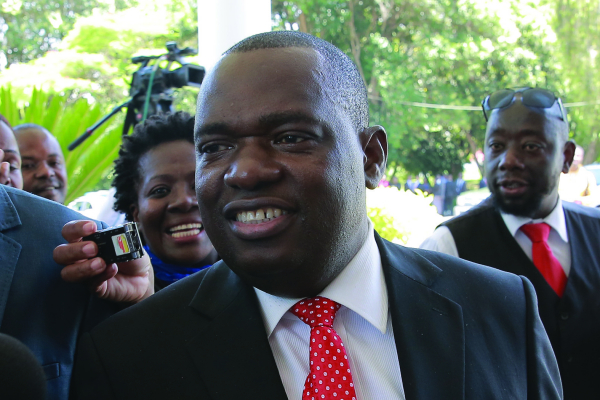
“This country came through the bullet, not the pencil. Therefore, it will not go by your X of the pencil . . . The next time, I will come next week to Jerera, the helicopter will be full of bullets. You know what you did,” these words by Lieutenant-General Angelbert Rugeje in Masvingo after MDC-T leader Morgan Tsvangirai defeated former President Robert Mugabe in the first round of polls in 2008 will remain engraved in many people’s memories.
By Everson Mushava
Indeed, the period before the June 27 presidential run-off in 2008 was real hell. Many people died and thousands were displaced due to State-sponsored violence, as Mugabe battled to overturn the first round poll defeat to Tsvangirai.
And exactly nine years on, Rugeje is the new Zanu PF national commissar under the leadership of President Emmerson Mnangagwa, who took over from Mugabe after a military action that broke Mugabe’s 37 year uninterrupted rule.
Ironically, Rugeje’s appointment came minutes after special adviser to the President and war veterans leader Christopher Mutsvangwa’s utterances that Zanu PF will use the military to secure electoral victory in 2018.
Mutsvangwa’s words also came a week after Masvingo Provincial Affairs minister Josiah Hungwe made similar comments to use the military, quoting the Bible to justify military involvement in politics where judges were also army commanders.
Rugeje now joins his fellow generals Air Chief Marshal Perrance Shiri and Lieutenant-General Sibusiso Moyo in the politburo as Mnangagwa makes appointments to appease the military that secured him the presidency.
While it is a global trend to appoint generals to civilian posts, the conduct of the military in the past to spearhead terror campaigns to prop up Zanu PF is enough to set tongues wagging.
- Chamisa under fire over US$120K donation
- Mavhunga puts DeMbare into Chibuku quarterfinals
- Pension funds bet on Cabora Bassa oilfields
- Councils defy govt fire tender directive
Keep Reading
Soon after Rugeje’s appointment, many Zimbabweans took to social media castigating Mnangagwa’s choice, accusing him of gradually, but surely dragging the country into a military state with himself as the civilian face of a junta.
“The appointment of Major Rugeje as the new Zanu PF commissar is proof that we are now a fully-fledged military dictatorship,” a top MDC-T official Charlton Hwende posted on Facebook.
MDC-T spokesperson Obert Gutu said: “We are closely watching the developments in the new Zanu PF. As the MDC-T, we are disturbed by the growing militarisation of the government.
“De facto, Zimbabwe is now being run by a military junta with Mnangagwa as the civilian face of the junta. This is a most worrying and unnerving experience. We would like to call upon President Mnangagwa to work very hard on demilitarising the State infrastructure.”
The MDC-T had been calling for security sector reform, accusing Mugabe’s government of militarising State institutions, but made a surprise move to support the generals after they staged a coup against Mugabe hoping to be part of the transitional government.
Former Zimbabwe People First spokesperson Jealousy Mawarire took to twitter saying: “Rugeje appointed Zanu PF Commissar; opposition supporters are in for some thorough beating. Some of us know what he did in 2008. He threatened villagers telling them he carried two bullets per every individual, one to kill the person and the other one for the beast to be eaten at the funeral.”
Political analyst Alexander Rusero said Mugabe’s ouster by the army has created a party-military conflation, but the situation falls short of qualifying the country as a military state.
He said it was normal given the role the military played towards deposing Mugabe.
“Under a military state or a militarised operation, all arms of State cease to function and all decisions are made from barracks,” Rusero said.
“However, it is wrong to want to assume or believe that the military has no role in politics, in Botswana generals actually become presidents, yet Botswana is a cherished democracy. Mnangagwa’s government has more civilians occupying meaningful posts than soldiers. A mere addition of three or four soldiers, who in essence basing on their credentials deserve the posts too, does not necessarily translate Zimbabwe into a military state.”
He added: “People have to understand the power dynamics. The military couldn’t risk their lives, roll out tanks and contribute towards removal of a president for a pat on the back or mere medals on uniforms.”
Zanu PF secretary for legal affairs, Munyaradzi Paul Mangwana said: “I don’t subscribe to that notion of having or using the military in the forthcoming elections, Zanu PF has the capacity to win the elections without the military. We don’t have an opposition to talk about in any case, so why use the military?”











